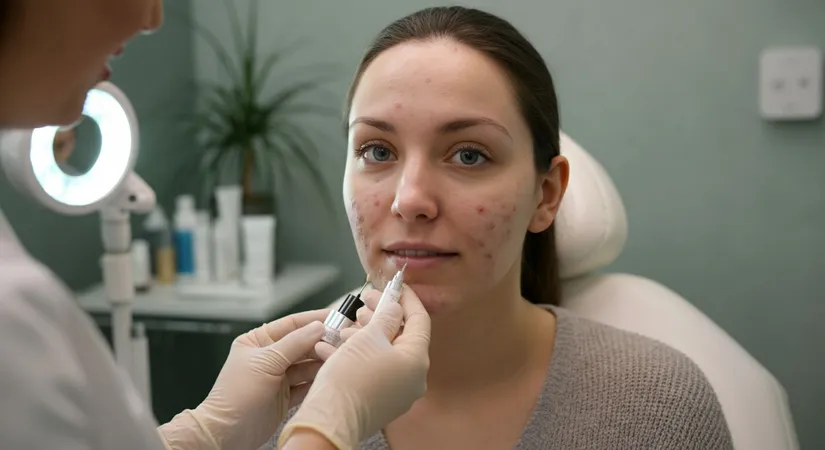Dermatologist Insights: Mastering Skin Care and Effective Acne Treatment
Transform your skin with dermatologist insights on care and advanced acne treatments.
The journey to healthier, more radiant skin often begins with understanding the role of a dermatologist. A dermatologist is not only an expert in diagnosing and treating skin conditions but also plays a pivotal role in guiding you to maintain optimal skin health. From acne treatments to crafting the perfect skin care routine, their insights are invaluable. In this comprehensive guide, we'll delve into the expertise of dermatologists and explore a range of effective strategies to tackle acne and enhance your skin care routine.
Understanding the Role of a Dermatologist in Skin Health
Comprehensive Skin Care Guidance
Dermatologists play a crucial role in providing comprehensive skin care guidance tailored to individual needs. They assess skin conditions and recommend personalized treatment plans, ensuring optimal skin health. For instance, a dermatologist might suggest specific acne treatments that target the root cause of breakouts, enhancing the effectiveness of the regimen. Additionally, they can advise on how to treat eczema at home, offering practical solutions that complement medical treatments.
Key Benefits of Consulting a Dermatologist
- Early detection of skin diseases, reducing the risk of severe health issues.
- Personalized skin care routines that cater to unique skin types and concerns.
- Access to advanced dermatological procedures and treatments.
Regular visits to a dermatologist can significantly improve skin health by addressing issues before they escalate. For those seeking preventative care, dermatologists offer insights into maintaining skin vitality through seasonal tips, such as winter skin care tips to combat dryness.
Steps to Achieve Healthy Skin with a Dermatologist
- Schedule a consultation to discuss skin concerns and goals.
- Undergo a thorough skin examination to identify underlying issues.
- Implement a dermatologist-recommended skin care routine for ongoing maintenance.
By following these steps, individuals can work towards achieving their skin goals effectively. Consulting a dermatologist not only addresses current skin issues but also provides a foundation for long-term skin health. For more insights on achieving flawless skin, visit Discovering the Path to Flawless Skin.

Crafting a Dermatologist-Recommended Skin Care Routine
Essential Steps for a Personalized Skin Care Routine
Creating a skin care routine tailored to your unique skin needs is crucial for maintaining skin health. A dermatologist-recommended routine typically begins with a gentle cleanser suitable for your skin type, followed by a moisturizer to ensure hydration. Sunscreen with an adequate SPF is essential for protecting your skin from harmful UV rays.
Key Components of a Dermatologist-Recommended Routine
- Gentle cleanser to remove impurities without stripping natural oils.
- Moisturizer to lock in hydration and maintain skin barrier function.
- Sunscreen to protect against UV damage and prevent premature aging.
Depending on specific skin concerns, a dermatologist may suggest products with active ingredients such as salicylic acid or benzoyl peroxide for acne or retinoids for anti-aging benefits. Regular visits to a dermatologist allow for adjustments to your routine as your skin’s needs change over time, ensuring that your skin care approach remains effective.
Steps to Personalize Your Skin Care Routine
- Identify your skin type and specific concerns with a dermatologist.
- Select products with ingredients that address your unique needs.
- Regularly review and adjust your routine based on skin changes.
By following these steps, you can develop a skin care routine that not only addresses current issues but also adapts to your skin's evolving needs. This personalized approach ensures long-term skin health and vitality.

Exploring Advanced Acne Treatment Options
Innovative Dermatological Procedures for Acne
Advanced acne treatments often involve innovative dermatological procedures that go beyond traditional methods. Micro-needling, for instance, is a popular choice for those seeking to improve skin texture and reduce acne scars. This procedure involves using tiny needles to create controlled injuries on the skin, which stimulates collagen production and enhances skin texture. It's particularly effective for individuals with deep acne scars, offering a noticeable improvement in skin smoothness.
Benefits of Advanced Acne Treatments
- Reduction in acne scars, leading to smoother skin texture.
- Stimulation of collagen production, promoting skin rejuvenation.
- Minimized risk of future scarring, enhancing overall skin health.
These treatments not only address existing acne but also help prevent future breakouts by improving the skin's resilience. Consulting with a dermatologist can help determine the most suitable procedure based on individual skin types and acne severity.
Steps to Choose the Right Acne Treatment
- Consult a dermatologist to assess your skin type and acne severity.
- Discuss potential treatment options, including micro-needling and laser therapy.
- Follow a personalized treatment plan tailored to your specific needs.
By following these steps, individuals can effectively manage their acne and improve their skin's appearance. Advanced treatments offer a comprehensive approach to achieving clearer, healthier skin, making them a valuable option for those struggling with persistent acne issues.
How to Find the Best Dermatologist for Acne Concerns
Key Considerations When Choosing a Dermatologist
Finding the right dermatologist for acne concerns involves evaluating several critical factors. Board certification is essential, as it ensures the dermatologist has met rigorous standards in dermatological care. Additionally, consider their experience with acne treatment, particularly with cases similar to yours. For example, a dermatologist with a history of successfully treating cystic acne might be more suitable for someone with severe acne issues.
Essential Questions to Ask Your Dermatologist
- What is your experience with treating acne similar to mine?
- What treatment options do you offer for acne management?
- How do you stay updated with the latest dermatological advancements?
These questions can help gauge the dermatologist's expertise and approach, ensuring they align with your needs. For instance, a dermatologist who regularly attends dermatology conferences may be more informed about cutting-edge treatments.
Steps to Identify the Best Dermatologist for Acne
- Research dermatologists in your area, focusing on their specialties and patient reviews.
- Schedule consultations to discuss your acne concerns and evaluate their proposed treatment plans.
- Assess their communication style and willingness to tailor treatments to your specific needs.
By following these steps, you can find a dermatologist who not only understands your acne concerns but also provides a personalized approach to treatment. This ensures a more effective and satisfying skin care journey, ultimately leading to healthier skin.
Advanced Dermatological Procedures for Acne Treatment
Personalized Skin Care Routines for Long-Term Health
Frequently Asked Questions
What does a dermatologist do for skin health?
How can I find the best dermatologist for acne concerns?
What is the best treatment for acne scars?
How can I create a dermatologist-recommended skin care routine?
What are some winter skin care tips recommended by dermatologists?
Discover the Path to 'Healthy Beauty' with estethica's Expert Care. Call Now for Your Free Consultation!
📞 Speak with Our Specialists Today!